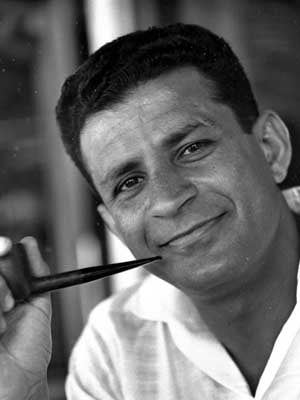Abie Nathan: Activist who campaigned for Middle East peace

Abie Nathan was a one-time Israeli bomber pilot who went on to devote decades of his life to pursuing a career of agitprop in the cause of peace and dialogue in the unpromising circumstances of the Middle East.
His efforts brought him two stretches behind Israeli bars and accusations that he was a quixotic – and unpatriotic – crackpot. But they also earned him warm tributes on his death, the Israeli president Shimon Peres describing his actions as "a beacon of light."
Although his main area of concern was the Middle East, his humanitarian efforts took him to Africa, India, South America and elsewhere. He raised much money for disaster relief, sometimes by going on hunger strike, a weapon which he also resorted to in protest against laws he opposed.
One of the most successful and long-running of his dozens of ventures was the establishment of a pirate radio station in the Mediterranean. This, broadcasting a popular mixture of politics and pop music, was partly financed by John Lennon. The vessel, the "Voice of Peace," remained on the air for decades, Nathan proclaiming in its 1973 maiden broadcast: "We hope through this station we will help relieve the pain and heal the wounds of many years of suffering of the people of the Middle East."
Born into a well-off Jewish family in Persia in 1927, he was educated in India where even as a boy he showed ecumenical tendencies and a willingness to embrace other cultures. His mother had him moved from a Catholic Jesuit school to a Jewish institution after discovering that he had a collection of Christian icons. He joined the RAF as a pilot in 1944, and by 1948 had volunteered as a pilot with the Israeli air force. This led to a traumatic experience when he visited an Arab village two days after bombing it.
"I wandered through the ruins and the burned bodies were scattered everywhere," he recalled. "I was faced with the consequence of destruction, wreckage and death carried out by a pilot bombing from the air."
The years that followed saw him flying as a commercial pilot with the El Al airline and running a Tel Aviv restaurant which achieved cult fame for its hamburgers and its bohemian atmosphere. His rise to national prominence came in 1966, when he broke all the rules and conventions of the day by staging a dramatic solo flight to Egypt. Travelling in an elderly plane painted white and emblazoned with the word "Peace" in various languages, he landed, uninvited, to explore peace with President Nasser.
He was courteously returned to Israel, which took a dim view of his unapproved overture. It was the first of many adventures which were often regarded as ranging from the quirky to the outlandish. At one point he took toys to both Egyptian and Israeli children; at another he began a custom of burying military toys on his birthday.
Another flight to Egypt resulted in a 40-day stay in jail in Israel. Two more prison terms followed for his action of meeting Yasser Arafat and other leading members of the Palestine Liberation Organisation. This was expressly illegal at the time.
His interests were worldwide: it seemed that everywhere that suffered a disaster received supplies from Nathan, and often a visit as well. He was involved in Bangladesh, Biafra, Cambodia, Colombia, Ethiopia, Lebanon, Nicaragua, Thailand and elsewhere.
Within Israel he awarded student scholarships which he named after fellow pilots who had been killed, as well as organising funds for the elderly and for needy families. He set up a welfare organisation named "Abie's Angels." He also travelled widely to meet figures such as Pope John Paul VI, Robert Kennedy and Jean-Paul Sartre. Over the years he received a number of peace and humanitarian awards.
His "Voice of Peace" station, meanwhile, broadcast on through the decades from a freighter moored in the Mediterranean outside Israeli territorial waters. Its popularity came partly from the fact that it was a rare Middle East source of pop music: according to one estimate, at one point it had more then 20 million listeners. But it was beleaguered by financial and legal problems and in 1993 he had it closed down and the ship was scuttled, to the strains of Pete Seeger's rendition of "We Shall Overcome."
Nathan was laid low by two strokes in the 1990s which affected his physical condition and ability to communicate. The silence which this imposed on him, after so many years in the public eye, led to reports that he had died. His death brought to an end a life of defiance of the conventional, marked by a drive to pursue his goals by stirring opinion through striking public actions.
On one of his periodic hunger strikes, when he thought he was going to die, he purchased a grave. He said he would like his headstone engraved "Misiti," Hebrew for "I tried."
A bie Nathan, political activist: born Abadan, Persia, 29 April 1927; married twice (one daughter); died Tel Aviv 27 August 2008.
Join our commenting forum
Join thought-provoking conversations, follow other Independent readers and see their replies
Comments
Bookmark popover
Removed from bookmarks